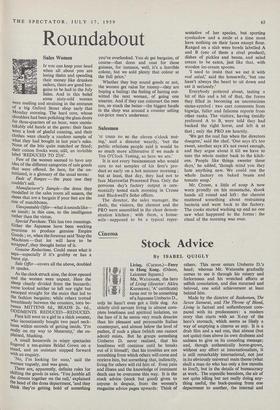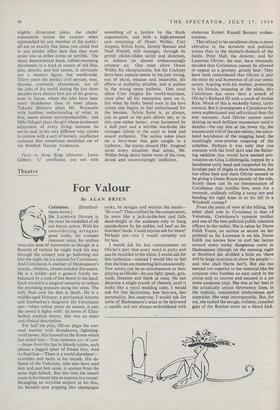Cinema
Stock Advice
By ISABEL QUIGLY Living. (Curzon.)—Ferry to Hong Kong. (Odeon, Leicester Square.)
MR. WATANABE, the hero of Living (director: Akira Kurosawa; 'A' certificate) turns out to be something of a Japanese Umberto D., only he hasn't even got a little dog. An elderly civil servant living in almost com- plete loneliness and spiritual isolation, on the face of it he seems very much drearier than his pleasant and personable Italian counterpart, and almost below the level of pathos, if such a place (which one cannot admit) exists. But he grasps something Umberto D. never realised, that his loneliness will continue until he breaks out of it himself; that his troubles are not something from which others will come and retrieve him, but something that, indirectly, living for others will rid him of. Even pain and illness and the knowledge of imminent death can be overcome this way. It is the stock advice (stock but good) given to anyone in despair, from the women's magazine advice pages upwards: Think of
others. This never enters Umberto D.'s head; whereas Mr. Watanabe gradually comes to see it through his misery and forlornness and his wretched efforts at selfish consolation, and dies mourned and beloved, one solid achievement at least behind him.
Made by the director of Rashomon, The Seven Samurai, and The Throne of Blood, Living is factual and unfiamboyant com- pared with its predecessors: a modern story that starts with an X-ray of the hero's stomach, which seems as likely a way of emptying a cinema as any. It is a drab film and a sad one, that almost (but not quite) rises above its own drabness and sadness to give us its consoling message; and, though authentically home-grown, without any effort at internationalism, it is still remarkably international, not just in its obviously universal main theme (what shall a man do who has only a few months to live?), but in the details of bureaucracy at work. The soporific boredom, the air of not quite idling but not really doing any- thing useful, the buck-passing from one department to another, the internal and slightly ill-natured jokes, the clerks' expressions across the counter when approached by any member of the public: all are so exactly like those you could find in any similar office here that they must strike you as either comic or terrible. The dusty departmental head, rubber-stamping documents in a kind of cavern of old files, pins, pencils, and lost causes, is obviously not a western figure, but world-wide. Thirty years the perfect civil servant, neat, discreet, continent, abstemious: not all the jolts of his world during the last three decades have shaken him out of his groove, even in Japan, where the jolts have been more thunderous than in most places. Takashi Shimura plays Mr. Watanabe with faultless understanding of what, at first, seems almost incomprehensible; and Miki Odagiri plays the girl whose exuberant enjoyment of every living moment he envies and, in his very different way, comes to imitate with a sort of homely, unaffected radiance that sometimes reminded me of the Swedish Harriet Andersson.
Ferry to Hong Kong (director: Lewis Gilbert; `U' certificate), put out with
something of a fanfare by the Rank organisation, and with a high-powered cast consisting of Orson Welles, Curt Jurgens, Sylvia Syms, Jeremy Spenser and Noel Purcell, still manages, through its grimly cliche-ridden script and direction, to achieve an almost embarrassingly amateur air. One must allow Orson Welles his idiosyncrasies, but his Cockney ferry-boat captain seems to me just wrong, out of place, miscast and miserable, his efforts at authority pitiable, and at pathos in the wrong sense pathetic. One must allow Curt Jurgens his world-weariness, since after all his reputation rests on it, but when he looks bored even in his love scenes one begins to feel embarrassed for the heroine. Sylvia Syms is, as always, just as good as the part allows her, or in this case rather better; even hampered by a dull part and a terrible wardrobe she manages (alone in the cast) to look and sound authentic. The action takes place on a ferry-boat that gets caught in a typhoon; the tramp aboard (Mr. Jurgens) saves every situation that arises, Mr. Welles being down below most of the time, drunk and unconvincingly inefficient.







































 Previous page
Previous page